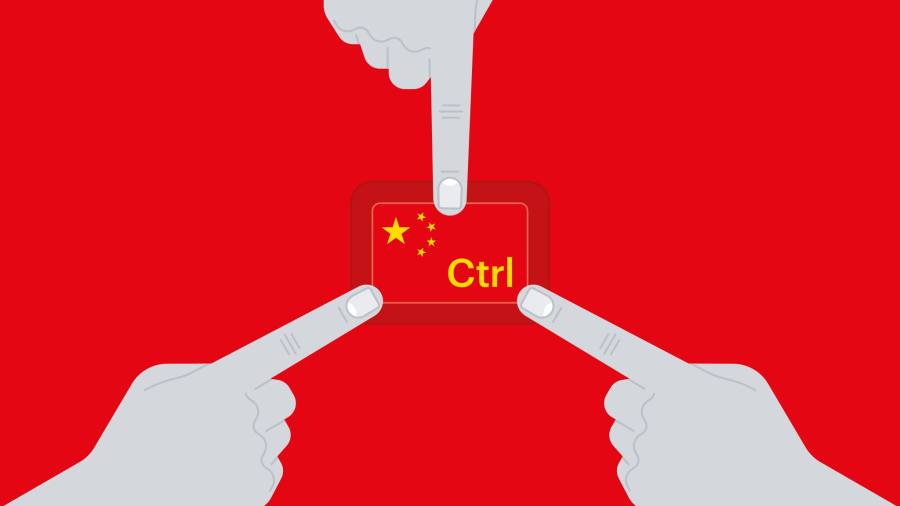[ad_1]
Consumers occupy a peculiar role in China’s tech landscape. They are valued customers of the gigantic platforms such as Tencent, ByteDance and Alibaba, whose strategists try to anticipate their every need. But they tend to lack a collective voice, meaning it is hard to fight privacy violations or manipulative selling strategies.
Consumers are also citizens: once grievances rise to a certain level, government regulators start to listen, to fend off any social disturbance. But this is a politically tinged process. Regulators want to push public opinion in the direction of their own agendas, using state propaganda. China’s consumer associations, which sometimes write damning reports about companies, are government-affiliated and often run by retired officials.
Last week’s Consumer Day show on state television — held annually on World Consumer Rights Day — is an important marker of where public opinion and political sentiment line up. This year, half the show was an investigative report into the use of facial recognition cameras by high-street shops, which were capturing the data without consent.
While it may be surprising to someone outside China, this broadcast was the natural conclusion to two trends that have emerged over the past few years: increased consumer awareness of data protection and growing government regulation of companies’ use of data.
The benefits of this to consumers are obvious: everyone in China remembers the mid-2010s, when phone numbers were traded easily and spam calls were frequent.
Now antitrust regulation looks to be the next big trend in policymaking, as the Chinese Communist party (CCP) begins to turn its focus from growth figures to more balanced development. Over the past six months, China’s antitrust regulator, the State Administration for Market Regulation, has gone from ignoring the booming tech industry to criticising companies including Meituan and Tencent.
Last November, the agency issued draft measures to cover the platform economy, bringing to an end the era of Chinese tech giants operating unchecked. And in December, the agency began an investigation into Jack Ma’s Alibaba ecommerce platform, a month after the government halted the IPO of Ma’s fintech giant Ant Group.
But this time the benefits for consumers, who seem caught between tech giants and the government, are not immediately obvious. The first big fight the regulators picked is indicative of this tension: in December, the target of their ire was online platforms’ “group-buying†schemes, which allow Chinese households to do what they universally love: band together to buy discount groceries.
“Buy groceries for a penny†was the pitch from delivery giants Meituan, Alibaba and many other platforms that joined the fray. People on social media flocked to try it, with one much-shared post detailing how an enterprising shopper had spent Rmb2,000 (about $310) on fancy seafood and received twice what she paid for. I’m not sure if the post went viral for its audacity or for the mouthwatering descriptions of every item in the bill.
Then the crackdown followed. The regulator told the group-buying platforms to stop their sharp discounts. The era of cheap king crab was over — for now.
Public opinion wavered, though most posts on the Weibo microblogging platform seemed to support the government’s decision. By flooding the market with subsidies, the giants were hurting the street retailers and would eventually have to raise prices for customers — in Chinese slang, “harvesting the chivesâ€. But the tactic works because consumers love it, so far at least.
Seafood obsession aside, there is a deeper issue at stake for China’s consumers in the rollout of antitrust enforcement: how can their voices be heard, rather than just regulators’ propaganda or tech giants’ lobbying? As a lawyer friend remarked: “So cheap groceries aren’t OK today. What won’t be OK tomorrow?†She was speaking of the arbitrariness and opacity of legal enforcement. In a country where tech giants have run rampant for years, where existing legislation is not fit for the era of platform tech, antitrust regulators now have a lot to sort out.
There’s no shame in China joining the ranks of countries that have no idea how to properly regulate their tech giants. But I hope for an educated discourse among China’s consumers, and citizens, about how to do so — rather than it being left solely to the CCP.
Yuan Yang is the FT’s deputy Beijing bureau chief
Follow @FTMag on Twitter to find out about our latest stories first. Listen to our podcast, Culture Call, where FT editors and special guests discuss life and art in the time of coronavirus. Subscribe on Apple, Spotify, or wherever you listen.
[ad_2]
Source link





